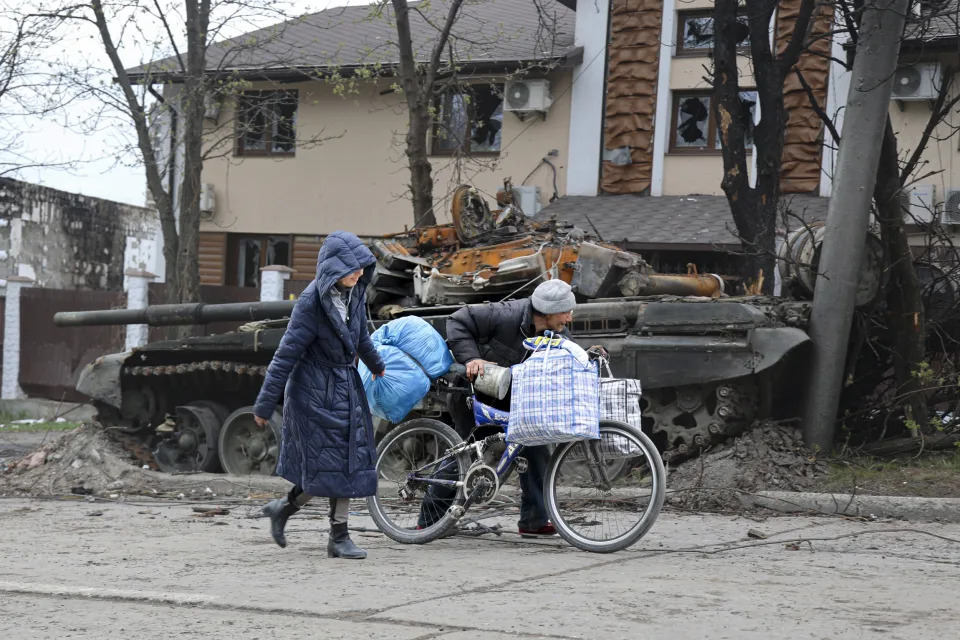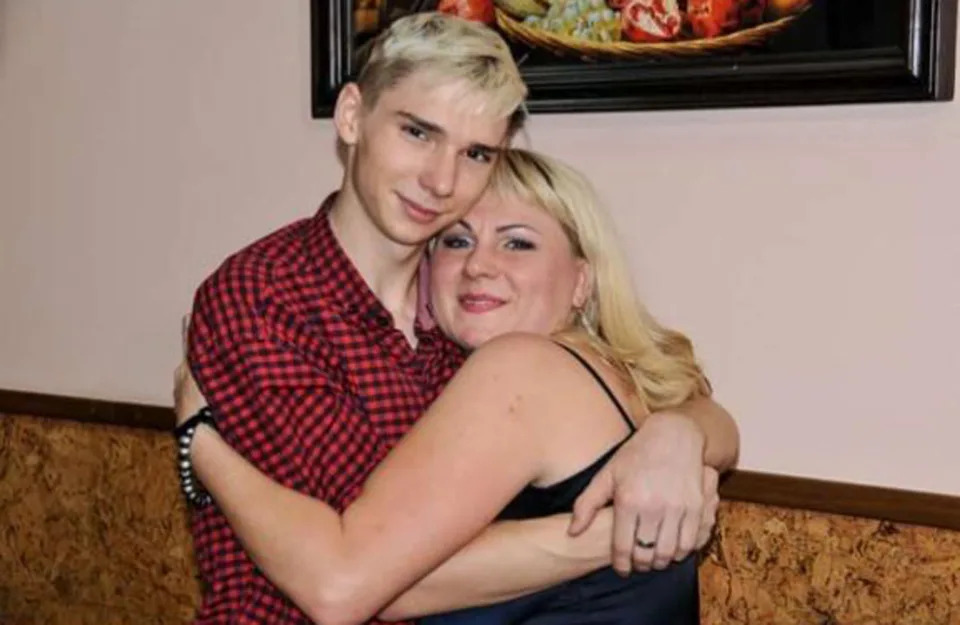NBC News
‘It was killing me’: Ukrainian mother says her son was forcibly deported to Russia
Yuliya Talmazan – April 24, 2022


Courtesy Yuri Dimesh

Alexei Alexandrov
Natalia Demish escaped the horrors of besieged Mariupol last month.
But while she is now in relative safety in the central Ukrainian city of Dnipro, she was cut off from her 21-year-old son, Yuri, by the ongoing fighting when she fled.
Demish, 40, says Yuri has now been forcibly deported to Russia, and she worries that he will be forced to fight against his own country.
Hers is just one story, but it adds to Kyiv’s accusations that while Russia has been assaulting Ukraine from the air and the ground, it has also been forcibly deporting large numbers of the country’s civilians. If true, these accusations could constitute a war crime under international law.
Kyiv accuses Russia of blocking efforts to send humanitarian aid to Mariupol, or buses to evacuate civilians to Ukrainian-controlled territory. The city has been under siege for nearly two months, and thousands have been killed, according to local officials. Remaining residents have been left with virtually no food, water or electricity.
Russian Defense Minister Sergei Shoigu said Thursday that more than 140,000 Mariupol residents had been evacuated through humanitarian corridors — temporary demilitarized zones — in the past month.
Demish, an accountant before the war, said she had spent 34 days hiding in a basement in Mariupol with her husband, his two daughters and his parents. After resorting to melting snow to make drinking water, they finally had had enough and took their chance to escape to the central city of Zaporizhzhia in a convoy of cars on March 29.
But Yuri, who was living with her former-husband in a neighborhood badly damaged by shelling, was cut off from her at the time, with no phone or internet connection. So Demish left without him, believing she had no other choice if she was to survive, and no way to reach her son.
Later that day, she finally heard from Yuri.
He said he and his father had walked to the city of Novoazovsk, some 25 miles east, after their building was fired on and Russian troops told them they had to head there if they wanted to stay alive, according to Demish. Novoazovsk has been under the control of Russian-backed separatists, who have been fighting Ukrainian forces in the country’s east since 2014.
After that, Demish had no communication with her son, an engineering student, for days. Then on April 4, Yuri sent her a message (seen by NBC News) via the Viber messaging app, which is widely used in Ukraine, in which he said: “We are forcibly going to Russia today.”
When she finally reached her son on the phone the same day, Demish said, he told her that they were put on a train and told they would be taken to Russia, but were not given the final destination.
Demish said she told him to run away and jump from the train.
“But he said, Mom, all the windows are shut. It’s not an option,” Yuri said.
“Not knowing where my son was, it was killing me,” Demish, speaking in Russian, told NBC News in a phone call from the city of Dnipro, in central Ukraine, where she moved after escaping to Zaporizhia.
After going silent again for more than a week, Yuri finally called his mother on April 15 to say that after three days on the train, they made it to the village of Semyonovka in Russia’s Nizhegorodsky Oblast or district, some 675 miles northeast of Mariupol.
He told her that he and other evacuees were being lodged in wooden houses surrounded by a forest, and that Russian volunteers were helping them by providing food and medicine.
But he said his phone had been searched and he was questioned about his family in Ukraine, and about any friends in the Ukrainian army.
They were allowed to move around the region, Yuri told his mother, but not outside it because they had been processed as refugees. Her son has his travel papers with him, and Demish said she was desperately looking for any way to get him out of Russia, potentially through neighboring countries like Georgia or Turkey.
Demish said that the last contact she had with Yuri was on Monday, when he told her on the phone that he was doing OK, but that they had been shown propaganda videos alleging that Ukraine as a nation was an “artificial concept” — a line that has been touted by Russian President Vladimir Putin for years and was used as one of the pretexts for Russia invading Ukraine in February.
“He said they told them that Ukraine never existed as a country, and that it’s part of Russia,” Demish said. “When he objected and said history can’t be rewritten, he said two men approached him and he was questioned for two hours.”
They also questioned why he wrote to his mom that he was forcibly sent to Russia, Demish said. He said he was never asked if he wanted to go to Ukraine instead, she added. “He was told that he would be recruited into the army in Ukraine if he did, and he would become cannon fodder, but he was now in Russia, a great country.”
NBC News could not independently verify what happened with Demish’s son in Russia.
Last month, Kremlin spokesperson Dmitry Peskov said reports that Ukrainian citizens had been forcibly taken from Mariupol to Russia were not true, though he said that the Russian military does help civilians leave the city.
Earlier this month, Michael Carpenter, the U.S. ambassador to the Organization for Security and Co-operation in Europe, said a fact-finding mission found evidence of forced deportation of Ukrainian civilians to Russia.
Carpenter said he could not confirm numbers or details of what’s happening with these deportees in Russia, but that it was “something that is going to require thorough investigation and follow-up because it’s just beyond the pale of not just civilized behavior, but beyond the pale of all behavior that we would consider normal.”
NBC News reached out to Russia’s Defense Ministry about forcible deportations to Russia from Ukraine, but received no response.
As much as Demish resents her son’s plight, she said she was also aware that he could have died in Mariupol had he stayed. “In the city, there is no heat, electricity or water. All stores are looted. It’s impossible to survive there,” she said. “I think people were ready to go anywhere just to be warm and have food.”
Her biggest concern is that her son could be forced to fight against his own country.
“I am worried that they will take our Ukrainian men, put Russian uniforms on them, get them into a bus and take them to Ukraine,” she said. “I am afraid there will be brainwashing and they will force them to take up arms and they will say, if you want to free up the city, go fight.”
But she hopes to get Yuri out of Russia soon and see him again, and that they can all return to Mariupol one day.
“I really want to come back,” she said, with sadness in her voice. “But only after it’s liberated. I don’t want to live under the Russian flag.”
